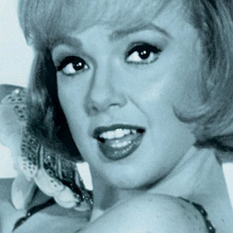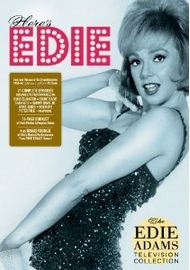
Here’s Edie
starring Edie Adams
The Edie Adams Television Collection

Are you into TV binge viewing? You know, sitting down with a microwave-sized bowl of popcorn and a sixer of Red Bull, watching all of The Sopranos in one eye-blurring marathon? Then this four-disc collection of Edie Adams’ two-year run on early TV is a good candidate for your next run. There’s 720 minutes of vintage television, and unlike so many 1960s re-releases, this collection has aged gracefully and is a joy to sit through.
Edie Adams is the sort of innocent sex bomb that is a poster girl for the Mad Men era. Her roster of guest stars is the crème de la crème of Midcentury Modern entertainment. It’s particularly great if you’re into the jazz scene of the time; there are the big names from Chet Baker to Count Basie to Stan Getz playing extended sets. The Civil Rights movement drops in, too as Adams appears shoulder-to-shoulder with Sammy Davis on screen as equals. Later we see the sunset of the Big Band era with Charlie Barnett in a shimmering jacket and an impossibly large collection of musicians all seated in a row with identical music stands. The comedians were the top of their trade: Bob Hope and an impossibly young Buddy Hackett are joined by Rowan and Martin, and Alan Sues, along with a Don Rickles cameo. It’s like everyone showed up for this kinescope party, and they’re having as good a time as the audience. Even the original cigar ads remain in the program, and they aren’t nearly as blunt as most early TV advertising.
Technically, this is the cleanest kinescoping I’ve come across. The video has that black-and-white halo, although the ads were shot on film and look more natural. The audio suffers very little from the aging process; while this soundtrack is nowhere near high-fidelity, it is noise free and has no artifacts to distract. These tapes have been in climate controlled storage for half a century and I hope Ms. Adams makes back her 50 years of electric bills on this release.
What really makes this show exceptional is the artistic freedom Ms. Adams had producing this show. Her sponsor octupled their sales from the show’s impact and they let her do whatever she thought was best. Ms. Adams’ contacts were wide ranging and she knew everybody famous in TV, stage, and music; they all appeared at one time or another. Take a look at this and see what TV might have become, and not what it is.












